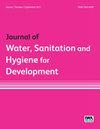Psychosocial factors influencing handwashing behaviour and the design of behaviour change interventions for the Rohingya camps in Bangladesh
IF 1.6
4区 环境科学与生态学
Q3 WATER RESOURCES
Journal of Water Sanitation and Hygiene for Development
Pub Date : 2022-09-26
DOI:10.2166/washdev.2022.167
引用次数: 1
Abstract
This study sought to identify the psychosocial factors that influence handwashing behaviour and to design behaviour change techniques applying the risk, attitude, norm, ability, and self-regulation (RANAS) behaviour change approach in Rohingya camps in Cox's Bazar, Bangladesh. This was a cross-sectional study conducted in four Rohingya camps located in Ukhiya and Teknaf sub-districts. Participants were selected by systematic random sampling. A structured interviewer-administered questionnaire was used. Analysis of variance testing (ANOVA) was used to determine the significant predicting variables. A total of 1,358 individuals participated in the interview. The mean age was 31.11 ranging from 13 to 75 years. The majority were female (84.9%). Around 75% of participants reported practising handwashing. Several psychosocial predictors were identified for handwashing behaviour with medium to large effect size such as health knowledge, beliefs about costs and benefits, feelings, social norms, abilities, and self-regulation factors. Significant predictors were additionally identified in individual camps. The behaviour change techniques included providing information, demonstration of handwashing, providing rewards, evoking emotions, and public commitments amongst others proposed in this study. Identified psychosocial determinants should be considered while promoting sustainable handwashing behaviour along with adequate supplies and infrastructure. This study also suggests to evaluate the proposed behaviour change interventions considering the contextual factors related to handwashing.影响孟加拉国罗兴亚难民营洗手行为的社会心理因素和行为改变干预措施的设计
本研究试图确定影响洗手行为的心理社会因素,并在孟加拉国科克斯巴扎尔的罗兴亚难民营中应用风险、态度、规范、能力和自我调节(RANAS)行为改变方法设计行为改变技术。这是一项在位于Ukhiya和Teknaf分区的四个罗兴亚难民营进行的横断面研究。参与者是通过系统随机抽样选出的。采用结构化的访谈者管理问卷。方差分析(ANOVA)用于确定显著的预测变量。共有1358人参加了访谈。平均年龄31.11岁,年龄13~75岁。大多数是女性(84.9%)。约75%的参与者表示正在练习洗手。对洗手行为的一些心理社会预测因素进行了鉴定,这些因素具有中到大的影响大小,如健康知识、对成本和收益的信念、感受、社会规范、能力和自我调节因素。在各个营地中还发现了重要的预测因素。行为改变技术包括提供信息、洗手示范、提供奖励、唤起情绪和公开承诺等。在促进可持续洗手行为以及充足的用品和基础设施的同时,应考虑已确定的心理社会决定因素。本研究还建议,考虑到与洗手相关的背景因素,对拟议的行为改变干预措施进行评估。
本文章由计算机程序翻译,如有差异,请以英文原文为准。
求助全文
约1分钟内获得全文
求助全文
来源期刊

Journal of Water Sanitation and Hygiene for Development
WATER RESOURCES-
CiteScore
3.10
自引率
11.80%
发文量
58
审稿时长
16 weeks
期刊介绍:
The Journal of Water, Sanitation and Hygiene for Development is a peer-reviewed journal devoted to the dissemination of high-quality information on the science, policy and practice of drinking-water supply, sanitation and hygiene at local, national and international levels.
 求助内容:
求助内容: 应助结果提醒方式:
应助结果提醒方式:


